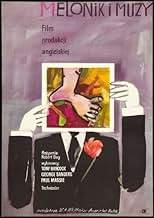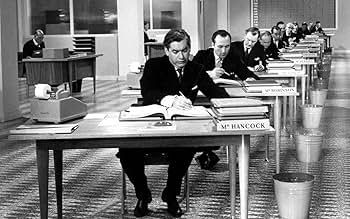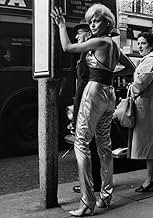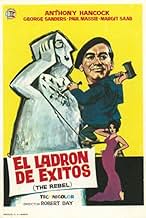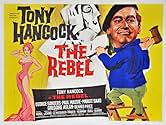IMDb RATING
6.8/10
1.2K
YOUR RATING
Tony Hancock gives up his day job to become an artist. He's a lot of enthusiasm, but little talent, and critics dislike his work. Nevertheless, he impresses a talented artist.Tony Hancock gives up his day job to become an artist. He's a lot of enthusiasm, but little talent, and critics dislike his work. Nevertheless, he impresses a talented artist.Tony Hancock gives up his day job to become an artist. He's a lot of enthusiasm, but little talent, and critics dislike his work. Nevertheless, he impresses a talented artist.
- Nominated for 1 BAFTA Award
- 1 nomination total
Gary Cockrell
- Artist
- (as Gary Cockerill)
Storyline
Did you know
- TriviaIn September 2002 the London Institute of Pataphysics recreated Alistair Grant's pieces for the film (down to Magnus Irvin's pyjama'd reworking of Tony's bicycle action painting, itself inspired by former Royal College of Art student Bill Green's output) at London's The Foundry, presenting the exhibition as if it were a retrospective of genuine unknown artist Anthony Hancock.
- GoofsWhen the two bodyguards appear on the luxury yacht their shirts are buttoned and unbuttoned showing vests underneath.
- Crazy creditsThe producers wish to acknowledge the fullest co-operation accorded - somewhat apprehensively - by BRITISH RAILWAYS.
- ConnectionsEdited into Urban Myths: Les Dawson's Parisienne Adventure (2020)
- SoundtracksAt Last ! At Last !
(L'Âme des Poètes)
(uncredited)
Music by Charles Trenet
French lyrics by Charles Trenet
English lyrics by Florence Miles
Featured review
Tony Hancock was the biggest British comedian of the late 50s and early 60s. Viewing his two (not entirely representative) films and watching (and listening) to his "Half-Hour" comedy shows (running separately, if concurrently, on BBC television and radio), young people (those under 35 or so) will probably find this fact baffling unless they are extraordinarily well-informed about social conditions in immediately postwar Britain. There also seems to be a kind of gender barrier. Women of my acquaintance, even those that satisfy the fairly stringent criteria I detail in my previous sentence, seem to have found Hancock uniformly unfunny.
Hancock's humour, it must be said, was unconventional. It is entirely driven by the dialectic, if you will, between character and situation. Hancock loathed gags, and forbade his scriptwriters (usually the brilliant duo of Ray Galton and Alan Simpson) to indulge in them. It is also exceptionally restricted in time (late 50s), social class ("shabby-genteel" lower-middle) and place (the south-east of England). Yet Hancock, who bestrode Britain like a colossus in his heyday, nurtured the powerful delusion that he could succeed in America.
It would take an amazing act of empathy on the part of an American to penetrate Hancock's humour as displayed in his radio and TV shows. As a technician he was flawless, possessing a sense of comic timing unequalled by anybody in Britain except the probably equally unexportable Kenneth Williams (perhaps best known outside the UK because of his strong involvement in the "Carry-On" series of films). Needless to say, Hancock and Williams, the two greatest British comedians of all time, loathed and vilified each other.
"The Rebel" (pointedly re-christened "Call Me Genius" in the America Hancock was desperate to impress) was released to great disappointment in 1961. In hindsight it has gained in favour, its initial cool reception a matter of some puzzlement.
Hancock, in the film, is an office drudge who harbours artistic ambitions way beyond his hopelessly limited technical skills. However, he jettisons his boring day-job to share an artistic garret in Paris (only 200 or so miles from London) with a frustrated, but genuinely talented, young artist (Paul Massie). Hancock's infantile daubs are hailed as works of genius in the pretentious circles he inhabits. Galton and Simpson's screenplay wastes no opportunity to satirise the credulity of the modern-art world, and its unfailing capacity to court lucrative charlatans.
Can those outside the British Isles understand this film? I hope so. The office environment and lodgings Hancock occupies are stultifying, but the artistic world of Paris is shown to be as corrupt and foolish in its own way (NB. the identically uniformed "Existentialists", indistinguishable, in a sense, from their bowler-hatted counterparts with whom Hancock works in central London). Art does get a slightly better press in this film than commerce, since the possibility of genuine artistic talent (i.e. Paul's (Hancock's young flatmate and protégé)) is acknowledged. Nevertheless, the presence of trend-hungry buffoons within the artistic world (e.g. George Sanders' art dealer) indicates the interpenetration of the commercial and artistic worlds. Is art-dealing George Sanders any less a despicable entrepreneur than Hancock's erstwhile manager in his City of London counting-house, John le Mesurier?
Although we speak essentially the same language (I think the differences are often over-stated), cultural barriers remain between the UK and the US. However, Americans would do well to look closely at Tony Hancock, partly for his intrinsic value, and partly for the huge influence, conscious and unconscious, he has wielded over the British psyche (here I controversially include Ireland, which remains culturally close to the UK). His second feature-film ("The Punch And Judy Man"), while telling in its own way, is less valuable overall, both inside the UK (and its satellites) and beyond.
Hancock's humour, it must be said, was unconventional. It is entirely driven by the dialectic, if you will, between character and situation. Hancock loathed gags, and forbade his scriptwriters (usually the brilliant duo of Ray Galton and Alan Simpson) to indulge in them. It is also exceptionally restricted in time (late 50s), social class ("shabby-genteel" lower-middle) and place (the south-east of England). Yet Hancock, who bestrode Britain like a colossus in his heyday, nurtured the powerful delusion that he could succeed in America.
It would take an amazing act of empathy on the part of an American to penetrate Hancock's humour as displayed in his radio and TV shows. As a technician he was flawless, possessing a sense of comic timing unequalled by anybody in Britain except the probably equally unexportable Kenneth Williams (perhaps best known outside the UK because of his strong involvement in the "Carry-On" series of films). Needless to say, Hancock and Williams, the two greatest British comedians of all time, loathed and vilified each other.
"The Rebel" (pointedly re-christened "Call Me Genius" in the America Hancock was desperate to impress) was released to great disappointment in 1961. In hindsight it has gained in favour, its initial cool reception a matter of some puzzlement.
Hancock, in the film, is an office drudge who harbours artistic ambitions way beyond his hopelessly limited technical skills. However, he jettisons his boring day-job to share an artistic garret in Paris (only 200 or so miles from London) with a frustrated, but genuinely talented, young artist (Paul Massie). Hancock's infantile daubs are hailed as works of genius in the pretentious circles he inhabits. Galton and Simpson's screenplay wastes no opportunity to satirise the credulity of the modern-art world, and its unfailing capacity to court lucrative charlatans.
Can those outside the British Isles understand this film? I hope so. The office environment and lodgings Hancock occupies are stultifying, but the artistic world of Paris is shown to be as corrupt and foolish in its own way (NB. the identically uniformed "Existentialists", indistinguishable, in a sense, from their bowler-hatted counterparts with whom Hancock works in central London). Art does get a slightly better press in this film than commerce, since the possibility of genuine artistic talent (i.e. Paul's (Hancock's young flatmate and protégé)) is acknowledged. Nevertheless, the presence of trend-hungry buffoons within the artistic world (e.g. George Sanders' art dealer) indicates the interpenetration of the commercial and artistic worlds. Is art-dealing George Sanders any less a despicable entrepreneur than Hancock's erstwhile manager in his City of London counting-house, John le Mesurier?
Although we speak essentially the same language (I think the differences are often over-stated), cultural barriers remain between the UK and the US. However, Americans would do well to look closely at Tony Hancock, partly for his intrinsic value, and partly for the huge influence, conscious and unconscious, he has wielded over the British psyche (here I controversially include Ireland, which remains culturally close to the UK). His second feature-film ("The Punch And Judy Man"), while telling in its own way, is less valuable overall, both inside the UK (and its satellites) and beyond.
- JekyllBoote-1
- Nov 28, 2002
- Permalink
- How long is Call Me Genius?Powered by Alexa
Details
- Release date
- Country of origin
- Languages
- Also known as
- Buntovnik
- Filming locations
- Bingham Road railway station, Addiscombe, Croydon, London, England, UK(Fortune Green South Station)
- Production company
- See more company credits at IMDbPro
- Runtime1 hour 45 minutes
- Aspect ratio
- 1.66 : 1
Contribute to this page
Suggest an edit or add missing content


